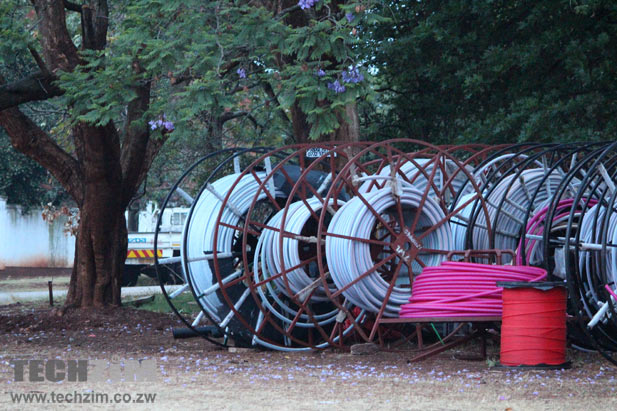


Robert Ndlovu You have seen men and women at work digging trenches and laying cables parallel to major highways from Harare to Bulawayo, Harare to Mutare.
Even within the cities and towns you have seen yellow, red or blue pipes being buried underneath the ground.
This is laying of fibre optics. Instead of laying copper cables, use of fibre optics offers high speeds to connect cities also they have a greater data and information carrying capacity than copper cables over long distances. Since this technology uses light to carry information it is immune from electromagnetic forces. And theft of buried is a futile exercise unlike copper as used fibre wont fetch a dime even “siyaso musika”
In short, fibre optics technology involves uses of “hair” thin glass strands to enable communication by use of light travelling inside the tiny glass tube.
This has made it possible to connect land locked Zimbabwe to Asia, Europe and the Americas via Beira and Capetown interconnections via undersea cables. Within urban centres this technology has enabled various telecoms companies to interconnect their base stations to their switches using fibre optics hence offering true 3G/4G and soon LTE so that end users can experience true broadband internet.
Fibre optics technology is not a new tech boom in Zimbabwe as ZESA offshoot Powertel used the former‘s electric grid to lay their fibre to connect to the outside world via Botswana Telecoms. Other players who have been laying cable for local and inter-city connectivity include Telco Internet, Liquid & ZOL, Telone, Telco Internet, Broadlands, Aquiva Wireless, Africom, Telecel, NetOne and maybe more.
So What?
Fibre optics has given birth to higher speed internet connectivity referred to as broadband. One provider called ZOL a cousin of Liquid has rolled out a very aggressive programme called Fibre to the Home (FTTH).
Like any new technology uptake is not vertical but like all technologies one day FTTH will be common. Telone, Telco, Powertel and Africom are doing also deploying their fibre rings around Zimbabwe where they have clients and at competitive prices too.
The geographical irrelevance of the internet has brought about means that even telephone calls can be made at lower costs across continents. Internet telephony fired up by high speed internet circuits, you can talk to your cousin in Gauteng while in Bulawayo in the same manner that you would converse with you aunt across town – as long they also have a high speed internet connection. Skype service works on this basis. Of late there are new voice services like FB calling, Viber and Whatsapp calling. This has been made possible by the opening up of the internet pipe – that is increased broadband speeds. It is a question of whether the cost of a telephone call will fall but when. (Mind you I wrote this original document in 2011 but then I was not mking much sense to many) .
In any case telephone companies route some of their voice traffic using the internet instead of expensive satellite connections or dedicated trunks (E1s) in the case of Zimbabwe. The use of the internet to carry voice is technically referred to as voice over internet telephony (VoIP) and is forcing traditional telephony companies all over the world to remodel and reshape their business strategies. While this kind of technology will not eliminate mobile wireless (GSM & CDMA) revenues, it is a fact that it is already “eating” into them.
Call Centres — Job creation
A Call Centre is a system that handles both high volumes of incoming and outgoing calls as efficiently and economically as possible. Call Centres handle calls, then route the calls to agents in a skillset that most closely matches the needs of the caller. “Press 1 to check your savings account balance, press 2 to cancel a pending wire transfer, press 3 speak to a Tele-Doctor – Yes”.
Listen Hard
A bank customer resident in New York calls the USA toll free customer services number to make an enquiry about a pending wire transfer from London and after being greeted by an auto attendant “Thank you for call Bank of New York your call will be answered by the next available agent” , his call is answered in the Phillipines ! The number is dialled in American but the receiver is located thousands of miles in Asia. Why and how? Many huge companies abroad prefer to “outsource” their non-core functions like customer services support to companies off shore. Not only is this cheaper for them but it enables them to focus on their core business – in this case banking. On the other hand the destination country Phillipines benefits by employment through employment creation. This is No rocket science. This setup is the basis of a call centre to make and receive calls on behalf of huge corporations who do not want any headaches about shipment details of their products but want to focus on what they know best.
India,Singapore, Phillipines are the leading call centre providers. South Africa and Kenya are also getting into the game and doing pretty well. Enter Zimbabwe. There is a New ICT Policy (2015) and this is my contribution. Whether a person or group support it or not there is a programme called ZIMASSET. What I know employment creation and value addition are part of it.
Zimbabwe — Putting the pieces together
There are basically two types of call centres – Inbound and outbound. An inbound call centre is setup so that call agents can take incoming calls and serves clients for the organisation or for corporation based abroad. An outbound call centre does the opposite. Corporations based in Europe and even in South Africa can outsource marketing of their insurance services to a call centre located right in the heart of the “City of Kings”. This is telemarketing. The use of a telephone to call potential or existing clients for new services and products in the destination market – in this case Europe. Yes a call centre in Marondera can market new cellular services for a cellular company based in Canada. Needless to repeat again and again, you will need a decent internet connection from one of the many licenced telecom operators in Zimbabwe in line with POTRAZ regulations.
Setting up a call centre
Technically , depending on the size of your call centre which can be made up of 10 to 1 000 and more seats depending on the volume of your business indicated by your call volume. You will need high speed internet connectivity, computers, earpieces with microphones, desks and chairs, computer cabling, redundant power supply, relevant software , partitioned cubicles for sound proofing, a monitoring station and a coffee maker! Bingo technically you are done. Of course you have to consult and or engage a deployment specialist who understands call centre technology for deployment , operation and support.
Robert Ndlovu is an ICT consultant based in Zimbabwe and specialises in Internet Telephony, Call Centres, Calling Card Technologies, Digital & Mobile Forensics , Solar Powered Wireless Systems amongst other ICT areas.
E-mail : wozatel@gmail.com : Mobile +263 77 600 2605 Twitter@robertndlovu : Skype@wozatel